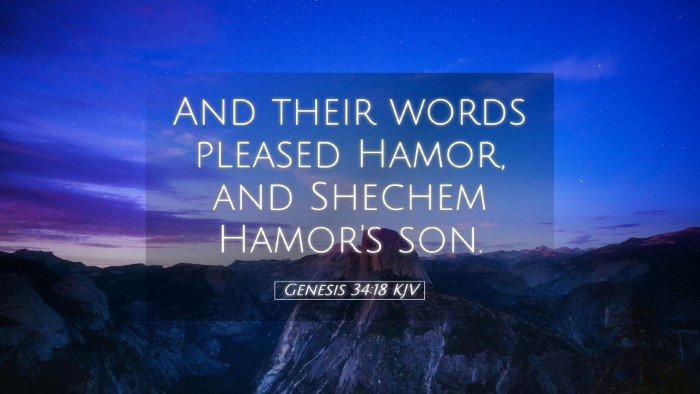Bible Commentary on Genesis 34:18
Genesis 34:18 states, "And their words pleased Hamor and Shechem, Hamor's son." This verse occurs during a pivotal moment in the narrative of Jacob's family, where the actions of Shechem put the integrity of the entire family unit at risk. In analyzing this passage, we will draw from various public domain commentaries, including insights from Matthew Henry, Albert Barnes, and Adam Clarke. The combined reflections will shed light on the significance of this moment within the broader biblical context.
Contextual Setting
In the previous chapters, we see Jacob and his family returning to Canaan after years of exile. Chapter 34 details Shechem's violation of Dinah, Jacob's daughter, and the subsequent negotiations that ensue between Jacob's sons and the inhabitants of Shechem. This particular verse highlights the response of Hamor and his son, Shechem, to the proposals made by Jacob's sons.
- Matthew Henry emphasizes the gravity of Shechem's actions. He notes that the attraction to Dinah carried serious consequences, not just for her but for the entire family. Hamor's willingness to engage in negotiations reflects a desperation to mend the offense.
- Albert Barnes provides insight into the cultural implications of Shechem's request. The proposal for intermarriage symbolizes a merging of identities and communities, which is frequently seen in ancient Near Eastern contexts. Barnes elicits concern over the potential dilution of Jacob's lineage and the covenantal promises associated with it.
- Adam Clarke points to the theme of consent and agency. He critiques the implications of this moment where Dinah's voice is notably absent, stirring a discussion about the treatment of women in biblical narratives and the importance of their dignity in relational dynamics.
Implications of the Negotiation
As we unpack the implications of the negotiations initiated by Hamor and Shechem, we recognize several theological and moral lessons that emerge:
- The seriousness of sin: The context of this verse cannot be detached from the act of sin that precipitated these events. The violation of Dinah serves as a somber reminder of the consequences of unchecked desires, as outlined by Henry. The very nature of Shechem’s willingness to negotiate reveals how sin complicates human relationships.
- The danger of compromise: Barnes warns against the danger inherent in intermarriage with those outside the community of faith. This moment points to the ease with which moral lines can be blurred, leading to the weakening of covenantal identity and moral standards.
- Covenant and community: The invitation for Jacob's family to become one with the people of Shechem raises the theme of communal identity. Clarke draws attention to the need for maintaining holy separation while engaging with those who do not share the same values. Jacob’s sons' responses to this proposition will further illuminate the tension between integrating and preserving a distinct identity.
Characters and Their Motivations
This verse allows us to discern the motivations of the key characters involved in this narrative:
- Hamor and Shechem: Their desire for reconciliation is apparent; however, their motivations may also reflect a self-serving agenda to consolidate power and control over Jacob’s family. Henry warns against viewing their actions in a purely positive light, as the intent behind their appeal must be scrutinized.
- Jacob's sons: The sons’ response is critical as they gauge both the honor of their sister and the integrity of their lineage. Their reaction serves as a counterbalance to the negotiation led by Hamor and Shechem and sets the stage for events that follow. Clarke notes that their response reveals a serious commitment to family honor.
Theological Reflections
From a theological perspective, this passage echoes the complexities of human relationships, sin, and redemption:
- Sin and its fallout: This narrative showcases sin's consequences as they ripple through families and communities. Just as Adam and Eve’s transgression in Genesis had communal repercussions, so too does the transgression of Shechem have dire implications for his entire community.
- Divine character: God’s sovereignty often works through human failings. Despite the chaos that ensues, the eventual story of redemption is woven into these narratives. Barnes reminds us that even amidst sin, God is working to preserve a lineage through whom redemption will come.
Conclusion
Genesis 34:18 encapsulates a moment of high tension and moral ambiguity in the narrative of Jacob's family. The negotiation between Hamor, Shechem, and Jacob's sons highlights serious themes of sin, compromise, and identity that resonate throughout Scripture. Through the insights of Matthew Henry, Albert Barnes, and Adam Clarke, we gain a richer understanding of the complexity of these themes and their significance for the community of faith today.
As we reflect upon these insights, it is essential for pastors, students, and scholars to consider the broader implications of how we navigate sin and interpersonal relationships in our own contexts. The narrative challenges us to maintain a distinct communal identity while engaging with a world that often looks to dilute our values.


